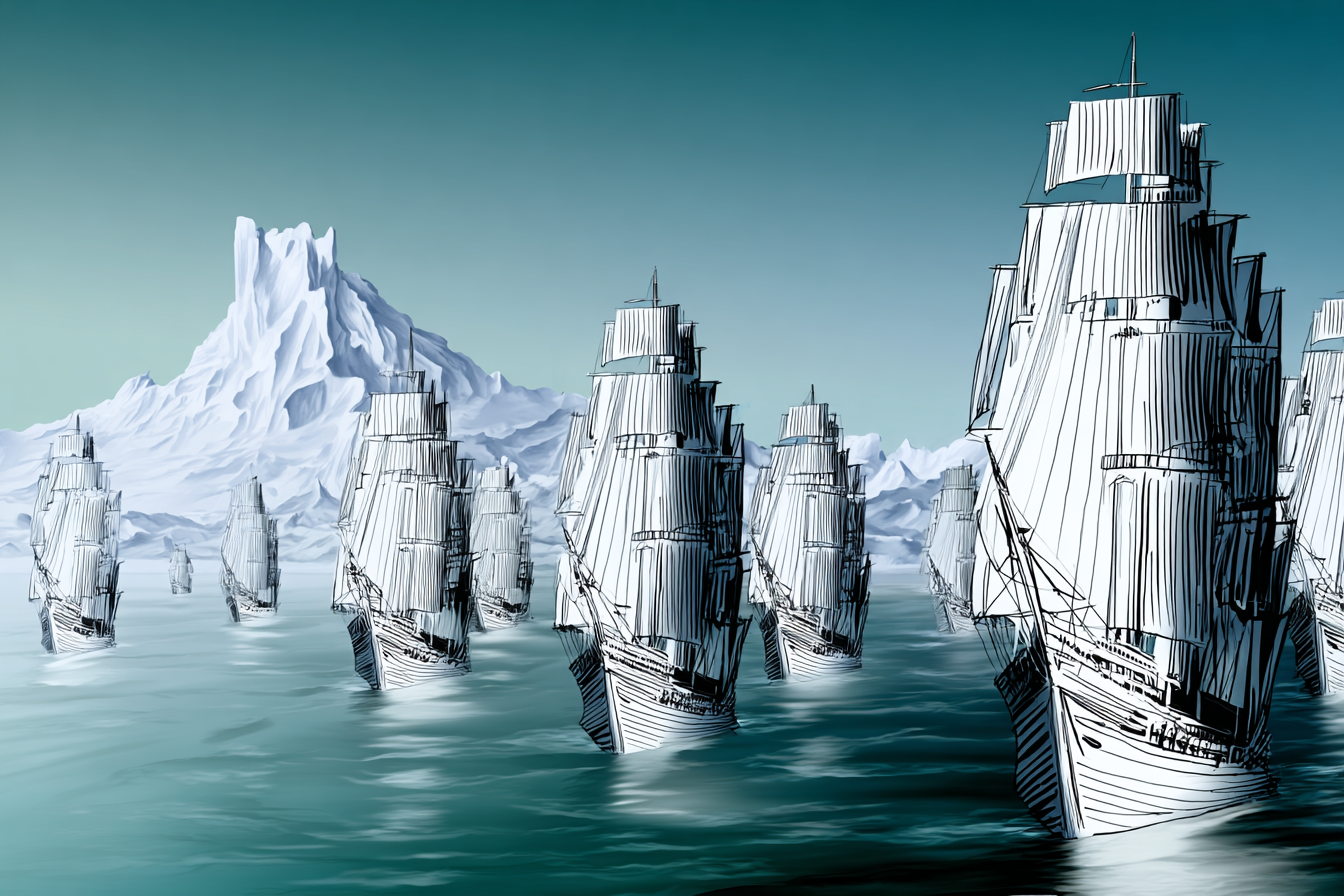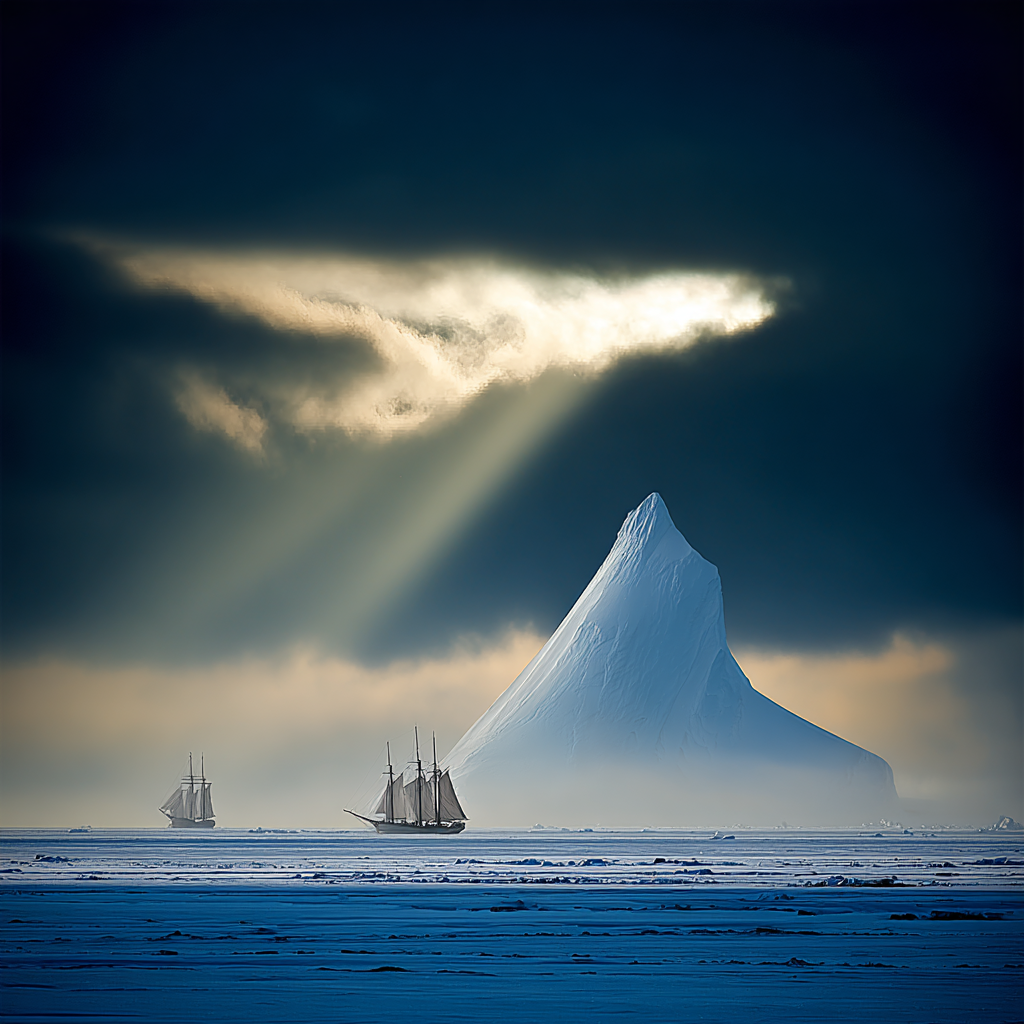Life has always been complex, but our understanding of exactly how complex has not always been, in and of itself, complex. Some people have a complex understanding of the complexity of existence; other people have a simple understanding of the complexity of existence.
As societies learn more about the world, our understanding doesn’t just expand—it becomes more complex, because knowledge itself creates new layers of uncertainty, debate, and possibility. This has the effect of creating a moving needing for just about everything, but in particular, what we consider “baseline knowledge.” What does everyone accept to be true, without question? Without fully understanding?
The shape of the planet. Germs. The existence of computers. Fractions. Atoms and molecules and distant galaxies. All things that were once, largely unknown.
Perhaps an apt analogy is that of an iceberg. This iceberg represents all knowledge.
Humanity is in a fleet of boats, sailing rapidly toward the iceberg. The fleet represents the social limitations of our collective knowledge. As all of society works to a.) acquire more knowledge and b.) provide access to said knowledge, we all draw nearer to the iceberg, which enables us to see it more clearly both as individuals and as a group.
But, from a distance, all we can know is the way the tip of the iceberg looks.
As we collectively draw nearer to the iceberg, the closest ship in the fleet sends explorers on a rowboat to learn more about the iceberg. They discover that it is safe to walk on and that it is very cold. Perhaps they learn there are penguins on it, or geographic features.
Then they return to the fleet.
Those on their own ship believe them wholeheartedly. But on other ships in the fleet, the reception of the information is varied. Some claim it is a hoax. Some are too busy fighting off scurvy to care. Some are mutinying. Others listen but have questions. Some receive false information—the telephone game effect.
At this point the collective knowledge of the fleet as a whole begins to diverge, and sub groups emerge. Each sub group has their own version of the Truth. Each group also contains individuals who become at least partially separate from the group; those who are willing to drift from group to group.
These are the arbiters of the information, who lend credibility or dissent to the rest of the group. They either leave the group to seek out new information or verify what’s been learned; or, they remain in the group and work to create ideological filters or barriers that prevent others from learning about the iceberg. This would be presented as “in the best interest of the group.” The sub-group would tend to view the person with respect and trust them to deliver and assess any new information based on their collective definition of Truth or reality.
Eventually, more explorers are sent to the iceberg, even as information continues to be shared or debated among the fleet. Some members of the fleet support the explorers and some do not.
As the explores dig deeper in their efforts to understand the iceberg, they realize that what they can see is only… pardon me, but… the tip of the iceberg. What they thought was just ice flotilla, is in fact an upside-down mountain range, most of which is invisible beneath the ocean’s surface.
This floating hunk of ice is far more complex than they’d realized. What’s more, is that while they now understand that the iceberg is far more than what it initially appeared, they don’t actually know what else it actually is. They only know that there is more to learn.
Their understanding itself has grown more complex.
Now they bring their new understanding of the iceberg back to the fleet.
“There’s more,” they say.
“More what?” they’re asked.
“Just… more.”
The word spreads. Some groups believe it and adjust their world view. Others don’t change. Still others lie to create a version of the story that aligns with their version of reality.
More information emerges. It’s all ice. About 90% of it is submerged; only 10% is visible to those in the fleet. It is made of fresh water, despite the fact the ocean is salty. The varying degrees of melting and breakup of the ice makes them very dangerous, liable to tip or roll at any moment.
And still, the researchers and explorers know there is more to learn. They haven’t discovered every detail, but their understanding has grown immeasurably.
And then… one of the ships discovers a second iceberg.
Now their ability to conceptualize doubles. The complexity of their iceberg world expands exponentially. If there are two icebergs, why not three or four or five or a hundred? If there are penguins on this iceberg, what other species might they discover?
The new knowledge of what IS, feeds the understanding not only of what could be, but of what probably is. Their ability to comprehend all that they don’t know is growing more rapidly than what they do know.
It’s like the mysterious they always say: "The more you know, the more you know you don’t know.”
The complexity of the world is inescapable—but whether our understanding deepens depends on whether we’re willing to let knowledge flow freely, even when it reshapes what we thought we knew.



